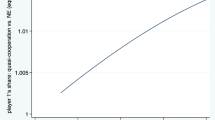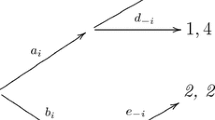Abstract
Orbell and Dawes develop a non-game theoretic heuristic that yields a ‘cooperator's advantage’ by allowing players to project “their own ‘cooperate-defect’ choices onto potential partners” (1991, p. 515). With appropriate parameter values their heuristic yields a cooperative environment, but the cooperation “depends, simply, on optimism about others' behavior” (1991, p. 526). In earlier work, Dawes (1989) established a statistical foundation for such optimism. In this paper, I adapt some of the concerns of Dawes (1989) and develop a game theoretic model based on a modification of the Harsanyi structure of games with incomplete information (1967–1968). I show that the commonly made conjecture that strategic play is incompatible with cooperation and the cooperator's advantage is false.
Similar content being viewed by others
REFERENCES
Ainsworth, Scott and Itai Sened (1993), The role of lobbyists: Entrepreneurs with two audiences, American Journal of Political Science 37: 834-866.
Axelrod, Robert (1984), The evolution of Cooperation. New York: Basic Books.
Axelrod, Robert and W.D. Hamilton (1981), The evolution of cooperation, Science 211: 1390-1396.
Dawes, Robyn M. (1989), Statistical criteria for establishing a truly false consensus effect, Journal of Experimental Social Psychology 25: 1-17.
Dawkins, R. (1989), The Selfish Gene. New York: Oxford University Press.
DeGroot, Moris H. (1970), Optimal Statistical Decisions. New York: McGraw-Hill.
Grafstein, Robert (1991), An evidential theory of turnout, American Journal of Political Science 35: 989-1010.
Harsanyi, John C. (1967-1968), Games with incomplete information played by 'Bayesian' players, Management Science 14: 159-182, 320-334, 486-502.
Mackie, J.L. (1978), The law of the jungle: moral alternatives and principles of evolution, Philosophy 53: 455-464.
Maynard-Smith, John (1982), Evolution and the theory of games. Cambridge: Cambridge University Press.
McLean, Iain (1981), The social contract in Leviathan and the Prisoner'sDilemma supergame, Political Studies 29: 339-351.
McLean, Iain (1991), What should rational cognitive misers do?, American Political Science Review 85: 1417-1418.
Orbell, John and Robyn M. Dawes (1991), A 'cognitive miser' theory of cooperators' advantage, American Political Science Review 85: 515-528.
Vanberg, Victor J. and Roger D. Congleton (1992), Rationality, morality, and exit, American Political Science Review 86: 418-431.
Author information
Authors and Affiliations
Rights and permissions
About this article
Cite this article
Ainsworth, S.H. A strategic foundation for the cooperator's advantage. Theory and Decision 47, 101–110 (1999). https://doi.org/10.1023/A:1005084823048
Issue Date:
DOI: https://doi.org/10.1023/A:1005084823048




